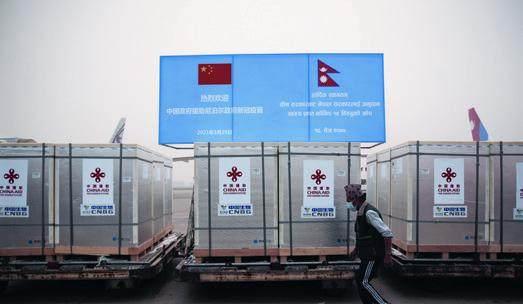KEEPING PACE WITH THE TIMES
2021-06-30ByYuHongjun
By Yu Hongjun

As the Communist Party of China (CPC) celebrates the 100th anniversary of its founding, how the Party manages relations with the rest of the world has become a main focus of attention.
Since its inception, the CPC has been a progressive party with an international vision. During the revolutionary years, it won the support and sympathy from many other countries. Since the founding of the Peoples Republic of China in 1949, the CPCs international relations have become part of Chinas diplomacy, contributing to the countrys development as well as reform and opening up.
Global ties
In early 1949 when victory for the CPC-led revolution was in sight, Mao Zedong and other leaders met with Anastas Mikoyan, member of the Political Bureau of the Central Committee of the Communist Party of the Soviet Union, in Xibaipo, Hebei Province, which hosted the headquarters of the CPC at the time. In the summer of that year, a CPC delegation paid a secret visit to the Soviet Union to discuss the establishment of embassies and the future bilateral relations. These were important steps taken by the CPC to prepare itself for its new role as Chinas ruling party.
The International Department of the CPC Central Committee was established in 1951, aiming to expand and deepen its international exchanges. Within the framework of the CPCs inter-party relations, social organizations like trade unions and womens federations were also active in forging external contacts.
In the late 1960s, the CPCs foreign exchanges, like the overall diplomacy of the country, encountered setbacks. There was no substantial change in the fundamental idea that the Partys international relations must serve state-to-state relations.
In the late 1970s, the CPC began to establish relationships with nationalist parties in Africa, all the while working with left-wing parties in Western nations.
Based on the principles of independence, equality, mutual respect and non-interference in each others internal affairs, China developed inter-party relations with the political parties of various countries ready to connect with the CPC.
The CPCs international relations were no longer ideology-driven, but aimed to meet the needs of Chinas reform, opening-up and modernization drive.
The China Association for International Understanding and the Chinese Peoples Association for Peace and Disarmament were founded in 1981 and 1985, respectively, with the goal of carrying out foreign exchanges in a flexible manner and further expanding the CPCs ties with other parts of the world. The CPCs relations with the ruling parties of socialist countries, too, were subjected to adjust- ments. In the late 1980s, after many ups and downs, a new pattern of the CPCs international relations took shape.
